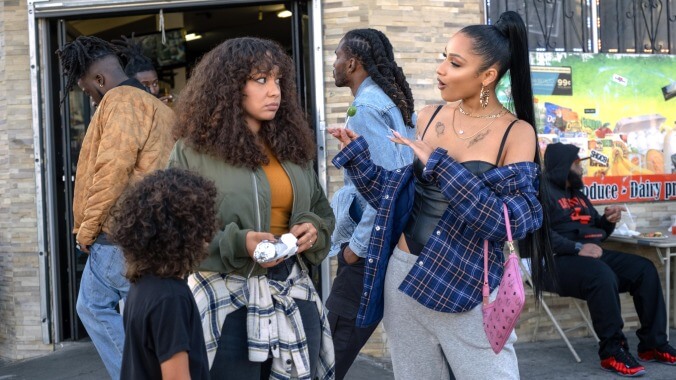Starz’s Blindspotting is one of the best film-to-TV adaptations in years

When Blindspotting hit the film festival circuit in 2018, the response from critics was unanimous: this film was a phenomenal debut for writing team Daveed Diggs and Rafael Casal. The film took an ardent look at Oakland community and culture while tactfully tackling issues of systemic racism, police violence, gentrification, and cultural appropriation. The story followed childhood friends Collin (Daveed Diggs) and Miles (Rafael Casal), but was shown primarily through Collin’s eyes as he finished his last three days of probation and dealt with the recklessness of Miles’ choices, which ultimately impact their friendship. We also saw how Ashley (Jasmine Cephas Jones), Miles’ girlfriend of 12 years and mother of his son Sean was affected by his thoughtlessness. Now she’s at the center of a spin-off, also titled Blindspotting, which premieres June 13 on Starz.
The series picks up in 2018, six months after the events of the film. Miles, still as careless as ever, gets arrested, leaving Ashley to pick up the pieces. Her world turned upside down, Ashley realizes she’ll need to rely on Miles’ family. After calling in a favor, Ashley and Sean (Atticus Woodward) pack up their home and move in with Miles’ mother Rainey (Helen Hunt) and his equally reckless and delusional half-sister Trish (Jaylen Barron). The story shifts from Collin’s POV to Ashley’s in a seamless stream of consciousness transfer. There’s a distinct difference in the storytelling to let the viewer know they are now experiencing Ashley’s world. Moments of fourth wall-breaking are more intentional, verse is deliberately sprinkled throughout, and the incorporated dancers and lighting help guide the ebb and flow of Ashley’s journey.
Jasmine Cephas Jones’ portrayal of Ashley conveys a struggle: the struggle to hold on to the good in the community she grew up loving while also wanting better for those in and around her life. Janelle (Candace Nicholas-Lippman) helps ground Ashley the way her brother Collin once hoped to center Miles. Nicholas-Lippman takes Janelle beyond the “best friend” trope and allows for the character to stake their own claim in this established world. Helen Hunt’s Rainey is dynamic as she attempts to deal with her extremely free-spirited daughter and incarcerated son. As the first half of the season unfolds, Rainey and Ashley connect in a meaningful way, as Rainey sees reflections of herself in the decisions Ashley makes.
While the series has beautiful and poignant moments, it is not without flaws. Ashley’s response to Trish’s sex work has a twinge of judgment that is hard to move past and, intentionally or not, adds to the stigmatization of consensual sex work. Without more nuance, it’s hard to tell if the audience is expected to agree with Ashley or disregard her statements as ignorance. The agency Trish shows might be seen as confrontational and hard-headed, but it’s easy to sympathize with her after seeing how she’s treated by others, including her boss and a loan officer. Another issue is the casting of Sean for the series. While it’s understandable that the child actor (Ziggy Baitinger) portraying Sean in the film is older now and recasting was necessary to move forward with the series, it’s jarring, to say the least, to see a noticeably lighter-skinned child in the same role. Atticus Woodward does a phenomenal job in the heavy adult-themed environment, maintaining childlike innocence throughout and bringing humorous moments to the story, but the recasting is glaring and perpetuates colorist casting choices that have come to light more in recent years.
Where this brilliant series most notably succeeds is in repositioning the same type of story within a new perspective, all while tackling how someone’s actions affect the lives of those around them. The show borrows heavily from the film, incorporating verse, fourth wall breaks, and isolating cutscenes, and stretches those moments to fit within Ashley’s perspective. Seith Mann (Homeland, #FreeRayshawn) directs the first few episodes, and his style seems heavily influenced by Spike Lee. But it’s fantastic to see how that influence creates a truly immersive and modern viewing experience.
Film-to-TV adaptations have often floundered, the charm or intent of the original getting lost in translation. This is not the case for Blindspotting, and that is mostly due to the fact that Diggs and Casal managed to build a world that can expand and narrow with each new entry. This could easily transform into an anthology series, where a different character takes the reins each season. Blindspotting is a must-watch, each episode a wonderful trip down a Bay area rabbit hole.